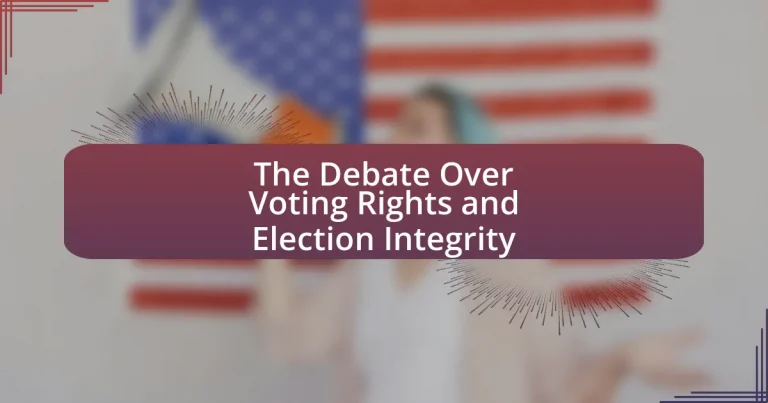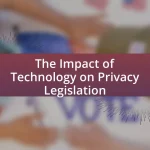The article examines the ongoing debate over voting rights and election integrity, highlighting the tension between ensuring access to the electoral process and maintaining election security. It discusses the fundamental importance of voting rights in democracy, historical events that have shaped current understandings, and the varying voting laws across states. The article also addresses the concept of election integrity, its key components, and how recent legislative changes impact both voting rights and public confidence in elections. Additionally, it explores the roles of advocacy groups and citizen engagement in shaping policies related to voting rights and election integrity.
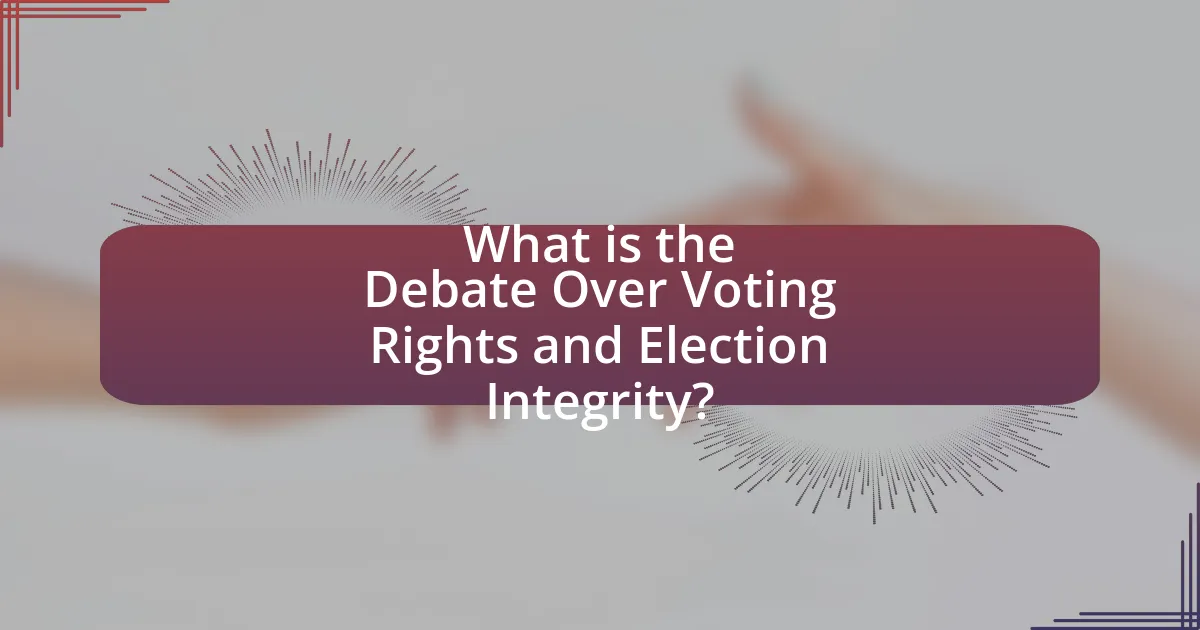
What is the Debate Over Voting Rights and Election Integrity?
The debate over voting rights and election integrity centers on the balance between ensuring access to the electoral process and maintaining the security and accuracy of elections. Advocates for voting rights argue that measures such as voter ID laws and purging voter rolls disproportionately affect marginalized groups, potentially disenfranchising eligible voters. Conversely, proponents of election integrity emphasize the need for safeguards against voter fraud, citing instances of irregularities in past elections as justification for stricter regulations. For example, a 2020 report from the Brennan Center for Justice highlighted that states with strict voter ID laws saw significant declines in voter turnout among minority populations. This ongoing discourse reflects broader societal tensions regarding democracy, representation, and the mechanisms that govern electoral participation.
Why are Voting Rights considered a fundamental aspect of democracy?
Voting rights are considered a fundamental aspect of democracy because they ensure that all citizens have the opportunity to participate in the political process. This participation is essential for the legitimacy of a democratic system, as it allows individuals to express their preferences and influence government decisions. Historical evidence, such as the Voting Rights Act of 1965 in the United States, illustrates the importance of protecting voting rights to prevent discrimination and ensure equal access to the ballot. Studies show that inclusive voting rights lead to higher civic engagement and representation, reinforcing the principle that democracy thrives when all voices are heard.
What historical events have shaped the current understanding of Voting Rights?
The current understanding of Voting Rights has been shaped by several key historical events, including the passage of the Voting Rights Act of 1965, the 15th Amendment ratified in 1870, and the Supreme Court’s decision in Shelby County v. Holder in 2013. The Voting Rights Act aimed to eliminate racial discrimination in voting, significantly increasing voter registration among African Americans in the South. The 15th Amendment established that the right to vote could not be denied based on race, laying a constitutional foundation for future voting rights protections. The Shelby County v. Holder ruling invalidated key provisions of the Voting Rights Act, leading to concerns about voter suppression and the integrity of elections, thus influencing contemporary debates on voting rights.
How do Voting Rights vary across different states?
Voting rights vary significantly across different states in the U.S., influenced by state laws and regulations. For instance, some states have implemented strict voter ID laws, requiring specific forms of identification to vote, while others allow voters to present a wider range of identification or none at all. Additionally, states differ in their policies on voter registration, with some offering same-day registration and others requiring advance registration weeks before an election.
Moreover, the accessibility of voting methods varies; states like California and New York provide extensive mail-in voting options, whereas states such as Texas have more restrictive mail-in voting policies. According to the National Conference of State Legislatures, as of 2023, 35 states have enacted laws that restrict voting access in various ways, while 20 states have passed laws to expand voting rights, illustrating the stark contrast in voting rights across the nation.
What is meant by Election Integrity?
Election integrity refers to the assurance that elections are conducted fairly, transparently, and in accordance with established laws and regulations. This concept encompasses various aspects, including the security of voting systems, the accuracy of vote counting, and the prevention of fraud. For instance, the U.S. Election Assistance Commission reported in 2020 that states implementing robust security measures, such as paper ballots and risk-limiting audits, significantly enhance election integrity by ensuring that votes are accurately recorded and verified.
What are the key components that contribute to Election Integrity?
The key components that contribute to election integrity include transparent electoral processes, secure voting systems, accurate voter registration, and effective oversight mechanisms. Transparent electoral processes ensure that all steps, from candidate nominations to vote counting, are open to public scrutiny, fostering trust among voters. Secure voting systems, such as paper ballots and risk-limiting audits, protect against tampering and ensure accurate results. Accurate voter registration prevents fraud and ensures that only eligible voters participate, while effective oversight mechanisms, including independent election monitors, help to detect and address irregularities. These components collectively uphold the integrity of elections, as evidenced by studies showing that jurisdictions with robust election security measures experience fewer instances of fraud and higher public confidence in electoral outcomes.
How do Election Integrity measures impact voter confidence?
Election integrity measures significantly enhance voter confidence by ensuring the security and accuracy of the electoral process. When voters perceive that elections are conducted fairly and transparently, they are more likely to trust the outcomes. For instance, a study by the Brennan Center for Justice found that states implementing robust voter ID laws and post-election audits reported higher levels of public trust in election results. This correlation indicates that when voters believe their votes are protected and counted accurately, their confidence in the electoral system increases.
What are the main arguments in the debate over Voting Rights and Election Integrity?
The main arguments in the debate over Voting Rights and Election Integrity center around the balance between ensuring access to the ballot and maintaining the security of elections. Proponents of expanded voting rights argue that measures such as automatic voter registration and mail-in voting increase participation and are essential for a functioning democracy. They cite studies indicating that higher voter turnout leads to more representative governance. Conversely, advocates for stricter election integrity measures contend that these policies can lead to voter fraud, undermining public confidence in electoral outcomes. They reference instances of fraud, albeit rare, to support their claims for stricter identification requirements and monitoring. This ongoing debate reflects differing priorities regarding accessibility versus security in the electoral process.
What do proponents of expanded Voting Rights argue?
Proponents of expanded Voting Rights argue that increasing access to the electoral process is essential for a functioning democracy. They contend that measures such as automatic voter registration, extended voting hours, and mail-in ballots enhance participation, particularly among marginalized groups. Evidence shows that states with more accessible voting laws experience higher voter turnout; for instance, a study by the Brennan Center for Justice found that states implementing automatic voter registration saw a 10% increase in voter participation. This argument is rooted in the belief that equitable access to voting is a fundamental right that strengthens democratic governance and reflects the will of the people.
What concerns do critics of expanded Voting Rights raise?
Critics of expanded Voting Rights raise concerns about potential voter fraud, the integrity of election processes, and the dilution of individual votes. They argue that loosening regulations, such as voter ID requirements and same-day registration, could lead to increased opportunities for ineligible individuals to cast ballots. For instance, a study by the Heritage Foundation found over 1,300 cases of voter fraud in the U.S. since 2000, suggesting that even a small percentage of fraudulent votes can undermine public confidence in elections. Additionally, critics assert that expanded voting access may overwhelm election systems, leading to longer wait times and logistical challenges that could disenfranchise legitimate voters.
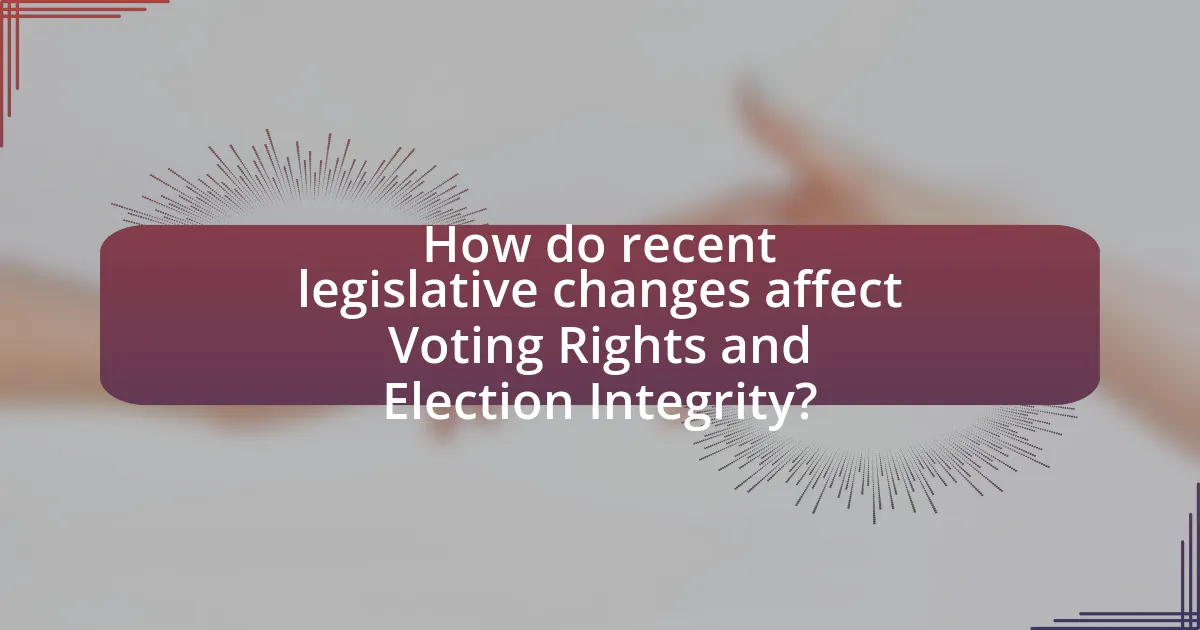
How do recent legislative changes affect Voting Rights and Election Integrity?
Recent legislative changes have significantly impacted Voting Rights and Election Integrity by introducing stricter voter ID laws and altering mail-in voting procedures. For instance, states like Georgia and Texas have enacted laws requiring specific forms of identification to vote, which critics argue disproportionately affect minority voters. Additionally, changes to mail-in voting, such as limiting drop-off locations and imposing stricter deadlines, can hinder access to voting for those unable to vote in person. These legislative actions have sparked widespread debate about their implications for fair access to the electoral process and the overall integrity of elections, as evidenced by numerous lawsuits challenging these laws on the grounds of voter suppression.
What new laws have been enacted regarding Voting Rights?
Recent laws enacted regarding voting rights include the John Lewis Voting Rights Advancement Act and various state-level measures aimed at expanding access to voting. The John Lewis Act seeks to restore and strengthen provisions of the Voting Rights Act of 1965, particularly by requiring jurisdictions with significant voting changes to receive federal approval. Additionally, states like Georgia and Texas have implemented laws that introduce stricter voter ID requirements and limit mail-in voting, which proponents argue enhance election security while critics claim they disproportionately affect minority voters. These legislative actions reflect ongoing national debates about voting access and election integrity.
How do these laws aim to protect or restrict Voting Rights?
Voting rights laws aim to protect or restrict access to the electoral process through various measures. Protective laws, such as the Voting Rights Act of 1965, were established to eliminate racial discrimination in voting, ensuring that all citizens, regardless of race, have equal access to the polls. Conversely, restrictive laws, often enacted in recent years, include voter ID requirements and purging of voter rolls, which critics argue disproportionately affect minority and low-income voters, thereby limiting their ability to participate in elections. For instance, a study by the Brennan Center for Justice found that states with strict voter ID laws saw a decline in voter turnout among minority groups, illustrating how such restrictions can undermine the fundamental right to vote.
What are the implications of these laws for marginalized communities?
The implications of voting rights laws for marginalized communities often include increased barriers to participation in the electoral process. These laws can lead to voter suppression tactics, such as strict ID requirements and purging of voter rolls, disproportionately affecting low-income individuals, people of color, and those with disabilities. For instance, a study by the Brennan Center for Justice found that states with strict voter ID laws saw a significant drop in voter turnout among minority groups, highlighting the direct impact of such legislation on marginalized populations.
What measures are being taken to ensure Election Integrity?
Measures to ensure election integrity include implementing voter ID laws, utilizing secure voting technology, and conducting post-election audits. Voter ID laws require individuals to present identification before casting their ballots, which helps verify voter identity and reduce fraud. Secure voting technology, such as paper ballots and risk-limiting audits, enhances the reliability of election results by providing a tangible record of votes. Additionally, post-election audits, which involve manually checking a sample of votes against the reported results, serve to confirm the accuracy of the election outcome. These measures collectively aim to bolster public confidence in the electoral process and ensure that elections are conducted fairly and transparently.
How do technology and cybersecurity play a role in Election Integrity?
Technology and cybersecurity are critical in ensuring election integrity by safeguarding the electoral process from manipulation and fraud. Advanced technologies, such as secure voting systems and blockchain, enhance transparency and accuracy in vote counting, while cybersecurity measures protect these systems from cyberattacks. For instance, the U.S. Cybersecurity and Infrastructure Security Agency (CISA) has reported that robust cybersecurity protocols can mitigate risks associated with foreign interference and hacking attempts, thereby reinforcing public confidence in election outcomes. Additionally, the use of encryption and secure communication channels helps maintain the confidentiality and integrity of voter data, further supporting the legitimacy of the electoral process.
What are the best practices for auditing elections?
The best practices for auditing elections include conducting risk-limiting audits, ensuring transparency in the audit process, and utilizing a combination of manual and automated verification methods. Risk-limiting audits involve checking a statistically significant sample of votes to confirm the accuracy of election results, which has been shown to effectively detect errors or fraud. Transparency is crucial; audits should be observable by independent observers and the public to build trust in the electoral process. Additionally, employing both manual counts and automated systems helps to cross-verify results, as demonstrated in various jurisdictions where discrepancies have been identified through this dual approach. These practices enhance the integrity and reliability of election outcomes.
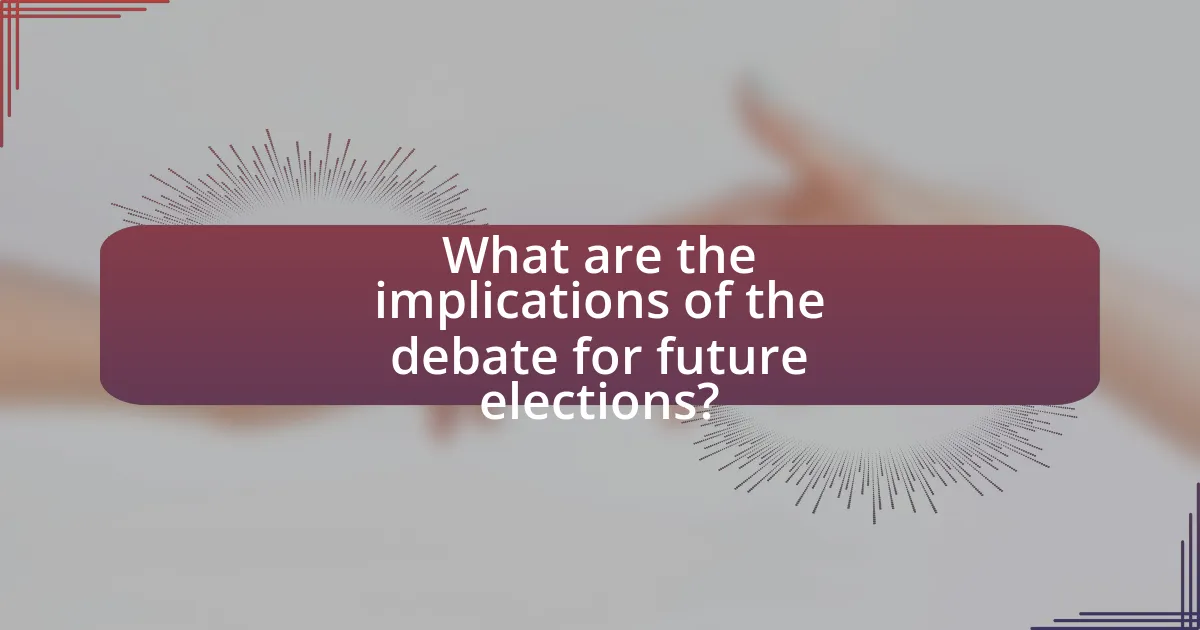
What are the implications of the debate for future elections?
The implications of the debate over voting rights and election integrity for future elections include potential changes in legislation, voter access, and public trust in the electoral process. As states consider new laws in response to the debate, such as stricter voter ID requirements or expanded mail-in voting, these decisions will directly affect voter turnout and participation rates. For instance, research from the Brennan Center for Justice indicates that states with more accessible voting laws tend to see higher voter engagement. Additionally, ongoing discussions about election security may lead to increased funding for technology and training, impacting how elections are conducted. Ultimately, the outcomes of this debate will shape the electoral landscape, influencing both the mechanics of voting and the perceptions of fairness among the electorate.
How might changes in Voting Rights impact voter turnout?
Changes in Voting Rights can significantly impact voter turnout by either facilitating or hindering access to the electoral process. For instance, the introduction of measures such as same-day registration and expanded early voting has been shown to increase participation rates, as evidenced by a study from the National Bureau of Economic Research, which found that states implementing these reforms saw a rise in voter turnout by approximately 5-10%. Conversely, restrictive measures like voter ID laws can decrease turnout, particularly among marginalized groups; research from the Brennan Center for Justice indicates that such laws can lead to a reduction in participation by up to 2-3% among affected populations. Thus, the nature of changes in Voting Rights directly correlates with the level of voter engagement in elections.
What demographic shifts could influence future voting patterns?
Demographic shifts such as increasing racial and ethnic diversity, urbanization, and changes in age distribution could significantly influence future voting patterns. For instance, the U.S. Census Bureau projects that by 2045, the nation will become majority-minority, with non-Hispanic whites making up less than 50% of the population. This shift is likely to impact political priorities and party alignment, as historically marginalized groups tend to have different voting behaviors and policy preferences compared to the majority population. Additionally, urban areas are experiencing population growth, which often correlates with more progressive voting trends, as seen in recent elections where urban centers leaned heavily Democratic. Furthermore, younger voters, who are more diverse and progressive, are increasingly participating in elections, as evidenced by the 2020 election where voter turnout among those aged 18-29 reached 50%, the highest level in decades. These demographic changes indicate a potential realignment in political power and influence in future elections.
How do public perceptions of Election Integrity affect electoral participation?
Public perceptions of election integrity significantly influence electoral participation, as individuals are more likely to vote when they believe the electoral process is fair and secure. Research indicates that when citizens perceive high levels of integrity in elections, their trust in the democratic system increases, leading to higher voter turnout. For instance, a study by the Pew Research Center found that 75% of voters who felt confident in the integrity of the election were more likely to participate compared to only 30% of those who expressed doubts about election security. This correlation highlights that negative perceptions of election integrity can lead to voter apathy and decreased participation rates, ultimately undermining the democratic process.
What strategies can be employed to balance Voting Rights and Election Integrity?
To balance Voting Rights and Election Integrity, implementing automatic voter registration and using secure, verifiable voting technologies are effective strategies. Automatic voter registration increases participation while ensuring that voter rolls are accurate and up-to-date, as evidenced by states like California, which saw a 20% increase in voter registration after adopting this policy. Secure voting technologies, such as paper ballots combined with electronic systems, enhance integrity by providing a reliable audit trail, as demonstrated in jurisdictions that have successfully used this method to verify election outcomes. These strategies create a framework that promotes both access to the ballot and the security of the electoral process.
What role do advocacy groups play in shaping policy on Voting Rights?
Advocacy groups play a crucial role in shaping policy on Voting Rights by mobilizing public opinion, influencing legislation, and holding policymakers accountable. These organizations, such as the American Civil Liberties Union and the NAACP, actively campaign for reforms that expand access to voting, such as automatic voter registration and the restoration of voting rights for felons. Their efforts are supported by research indicating that states with strong advocacy group presence often enact more progressive voting laws. For example, the Brennan Center for Justice reports that advocacy efforts have led to significant legislative changes in states like California and New York, where reforms have increased voter participation and accessibility.
How can citizens engage in the debate over Voting Rights and Election Integrity?
Citizens can engage in the debate over Voting Rights and Election Integrity by participating in public forums, contacting their elected representatives, and joining advocacy groups focused on these issues. Public forums, such as town hall meetings, allow citizens to voice their opinions and ask questions about voting policies. Contacting elected representatives enables individuals to express their concerns and advocate for specific legislative changes. Joining advocacy groups, such as the American Civil Liberties Union or the League of Women Voters, provides citizens with resources and a platform to mobilize efforts for reform. These actions contribute to a more informed and active citizenry, which is essential for a healthy democracy.
